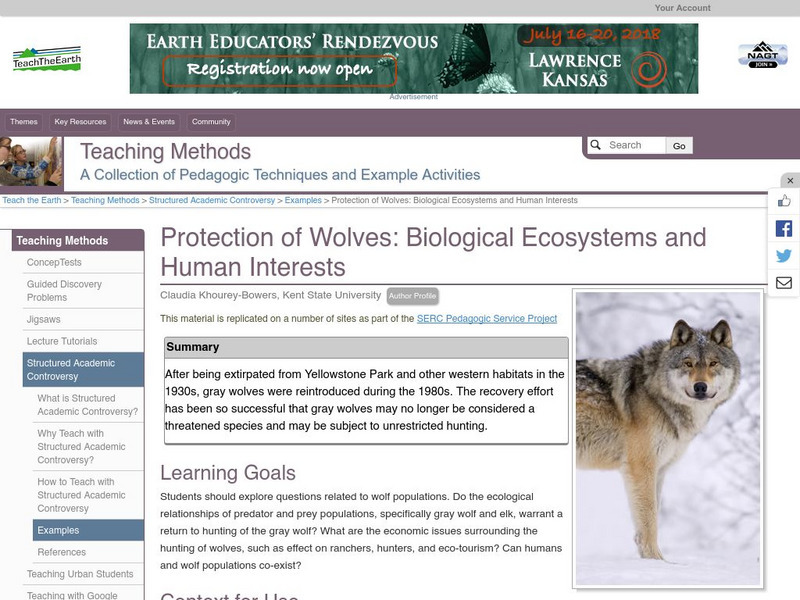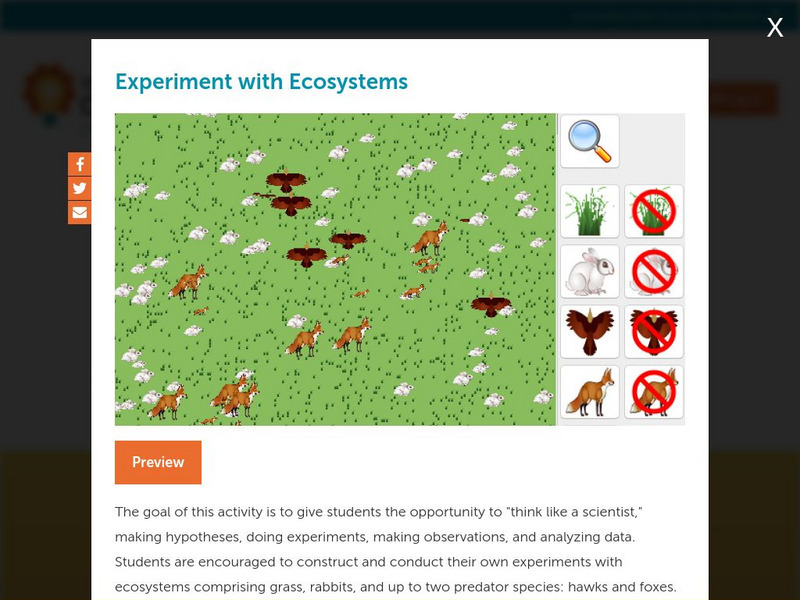Hi, what do you want to do?
Curated OER
Insects
Students construct a viable insect collecting apparatus. Students determine the effectiveness of the instrument he has designed by collecting specimens.
Curated OER
Mock-Muck
Students purify water samples using various techniques. In this water treatment lesson, students complete a variety of activities to learn about the process. A data chart is included for recording results. A crossword puzzle is included...
Curated OER
Species on the Edge
Students examine sea turtles. In this endangered species lesson, students analyze sea turtle habitats. Students hypothesize why sea turtles could go extinct.
Curated OER
Transforming Food Energy: A Balancing Act
Students explain their role as consumers. They use a purchased calorimeter or make their own simple calorimeter to measure the energy content in selected foods. This interesting lesson really gets students thinking about what they eat.
Curated OER
Create a Non-native/Invasion Species
Learners view a video about non-native/invasion species. They create a non-native/invasion species that they think would have an impact on farming, industry, recreation, or water in the local environment.
Curated OER
Salmon vs. Dams: The Dam Removal Debate on the Elwha River
High schoolers use roll playing to discuss the merits of tearing down these dams so that the Elwha River can run free. The activity is presented in the form of a council meeting to encourage students to try to build consensus in finding...
Curated OER
Name Match
In this name match worksheet, students match up ten species to their description or history by drawing a line between one to the other.
Curated OER
Bats
Students model how the bones in a bat wing are organized. They develop questions about bat body parts based on photographs. They hypothesize how bats locate their food.
Curated OER
Postcards from the Edge: Endangered Species
Young scholars use the internet to identify the endangered species in their state. Using this information, they create a postcard with a picture of the animal along with facts. They discuss the main reasons to protect the endangered...
Curated OER
Arsenic Globally
High schoolers, using directed questions, identify five internet resources. They use these resources to identify relevant information by highlighting those sections that address the provided questions. Students present the answers to...
Curated OER
Most Troublesome Exotic Invasive Plant Species Web Quest
Young scholars participate in a Web Quest activity in which they identify common exotic invasive plant species of the Southern Appalachian Region. After identifying the top 10 exotic invasive species, they choose one to research in depth.
Curated OER
Color Your World with Changes --- the Camouflage Game
Seventh graders, after predicting dominant colors foud in their habitat or garden, visit heir area on a monthly basis. They search for colored toothpicks, then graph the results, determining the dominant color for the month.
Curated OER
The Wildland/Urban Interface Dilemma
Students examine all sides of the issues surrounding wildland fire. Groups assume the roles of different people who must decide what to do about a fictitious wildfire. They have a discussion to analyze the issue. A good, real life lesson!
Curated OER
Who Works in This Forest?
Students examine the variety of jobs that are related to working in the forest. Information on the different jobs is provided in this lesson plan for the teacher to share with the students. The students create a collage using magazines...
Curated OER
Cicada Invasion
Students consider how some animals, periodical cicadas, survive well in a particular environment due to the species' life cycle.
Curated OER
Terrariums for Project Pals
Young scholars identify the components needed by plants to survive in the terrarium. In this biology instructional activity, students build their own terrariums using materials available. They present their project in class.
Science Education Resource Center at Carleton College
Serc: Protection of Wolves: Biological Ecosystems and Human Interests
Students will exam the different perspectives on why the gray wolf was reintroduced into many western states during the 1980s, the success of the reintroduction, and the benefits and problems from the recovery of the gray wolf...
Concord Consortium
Concord Consortium: Stem Resources: Experiment With Ecosystems
Learn what happens to different populations of organisms as their ecosystem changes. Design your own experiment and make your own guesses with what the result will be with this virtual ecosystem. Also experiment with producer/consumer...
Utah Education Network
Uen: Themepark: Systems: Ecosystem
Find a large collection of internet resources organized around ecosystems. Links to places to go, people to see, things to do, teacher resources, and bibliographies.
Open Ed
Open Ed Sci: 7.5 Ecosystem Dynamics
This unit on ecosystem dynamics and biodiversity begins with students reading headlines that claim that the future of orangutans is in peril and that the purchasing of chocolate may be the cause. Students launch a scientific...
PBS
Pbs Learning Media: How Disruptions Affect Animal Populations
Students explore the effects that ecosystem disruptions can have on animal populations. They learn about the disruptions that have driven three species-the Madagascar fish eagle, the Iberian lynx, and the rowi kiwi, to the brink of...
National Geographic
National Geographic: Symbiotic Relationships in Marine Ecosystems
In this lesson students analyze videos to make observations about species, populations, and communities of organisms and discuss their symbiotic relationships. Then they create a hypothetical marine ecosystem and describe the adaptive,...
Concord Consortium
Concord Consortium: Stem Resources: Predators and Prey
Did you ever want to be a hawk? In this virtual ecosystem, students will take on the role of a hawk and try to catch rabbits on a snowy field. Students will see which rabbits have adaptations that allow them to blend into the environment...

























